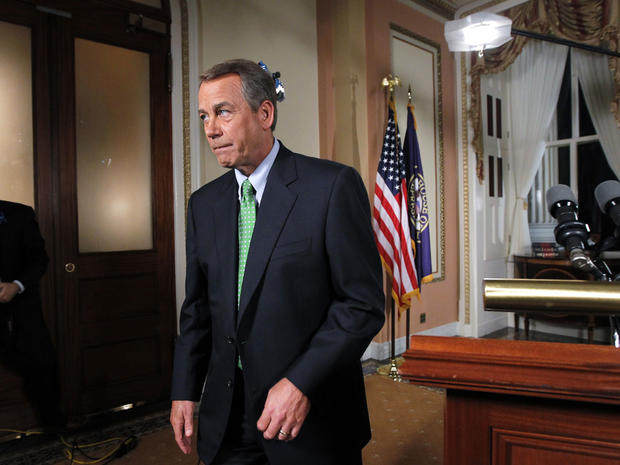Trouble? House GOP delays debt limit vote
Updated 6:53 p.m. Eastern Time
House Republican leaders have delayed their planned vote on a bill to increase the debt limit in a sign they do not have enough votes for passage.
The vote, which had been set for around 6 p.m. Eastern Time, has not been rescheduled, though a House GOP leadership aide told CBS News it is still planned for tonight. With the House leadership working to garner last-minute votes, the House held votes to name post offices before calling a temporary recess.
The Republican leadership has been working feverishly to get the votes to pass the bill over the objections of the fiscal conservative hard-liners in their caucus; earlier this week, House Speaker John Boehner (pictured) told members to "get your ass in line." Republicans fear that if the bill fails they will effectively hand Democrats both a political and legislative victory to conclude the protracted debt limit fight.
Republicans who have said they would vote no are now being called into Boehner's office; on his way in, Rep. Louis Gohmert of Texas quipped he had been called to the "principal's office." When he left, Gohmert told reporters he remains a "bloody, beaten down no." Reps. Trent Frank and Jeff Flake of Arizona would not discuss how they will vote when they left Boehner's office.
The vote is seen as a crucial test of whether Boehner can control his caucus, which includes many Tea Party-linked conservatives - many of them freshmen - who argued the bill did not go far enough to reduce spending. The bill has been opposed by outside groups like The Club for Growth, fiscally-conservative Republican Study Group head Rep. Jim Jordan of Ohio and Republican presidential candidate Rep. Michele Bachmann of Minnesota.
The House GOP bill, The Budget Control Act, would initially pair a $900 billion debt limit increase - enough to last until early January - with more than $900 billion in spending cuts. Passage may not ultimately matter: Senate Democratic leader Harry Reid vowed that if the bill passes, he will immediately put it up for a vote in the Senate, where he vowed "it will be defeated" through the unified opposition of Democrats.
Democrats say any debt ceiling deal should last through next year, and that the Boehner plan's short-term debt ceiling increase would create economic uncertainty and potentially result in the United States' Triple-A bond rating being reduced. Senate Democrats plan a vote on their own bill that would cut $2.2 trillion in spending over a decade and increase the debt ceiling by enough to last through the end of next year.
It's not clear how the Senate Democratic plan could get through the House, however, and the clock is ticking. The White House and others have warned that if Congress doesn't raise the $14.3 trillion debt ceiling by Aug. 2, the U.S. will lose its authority to borrow money and risk defaulting on its loans or failing to pay other significant financial obligations.

